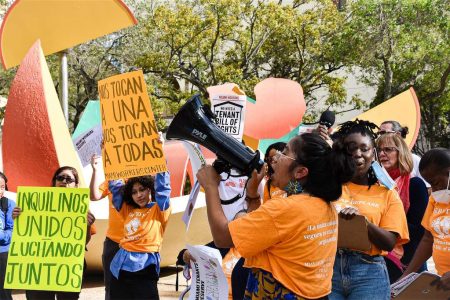Reproductive Justice is Housing Justice is Worker’s Justice

Black and Brown working-class women in South Florida experience many issues at once: housing insecurity, job precarity, depressed wages, unsafe working conditions, and state violence.
They have disproportionately borne the brunt of the pandemic’s job losses and economic fallout. In this context, formal and informal care economy workers have few avenues for support as they have less bargaining power, leaving them vulnerable to exploitation and predatory employment and housing practices, including unlawful evictions.
Evictions increase the likelihood of mental health crises, depression, lower birth weights, and poverty. Black women are more than twice as likely to have evictions filed against them as white people. Displacement and exploitation of tenants at the hands of landlords who violate the law or rights of tenants lead to negative public health and financial outcomes that impact the City of Miami and Miami-Dade County as a whole.
Miami Workers Center, a member-led organization, rooted in South Florida communities, drafted the Tenant Bill of Rights Legislation and, in 2021, won a $300,000 budget line item for a new Office of the Tenant Advocate with municipal staffing to protect the rights of renters and their families, reduce incidents of tenants and families living in uninhabitable conditions or experiencing illegal evictions, discrimination, and harassment.
It was member organizing that led directly to this victory, and this kind of organizing with women in the care economy brings to light the specific challenges faced by tenants and the impacts of those challenges on health and families, including reproductive health.
